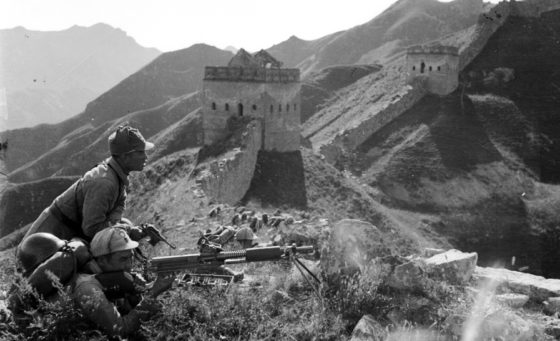
“The events of 1940 easily might have turned out differently. The consequences were all too clear to Winston Churchill.”
By Robin Prior
THE ‘GOOD GUYS’ may always win in Hollywood, but history has shown otherwise.
Consider the Peloponnesian War (431 to 404 B.C.) Athens, the ‘good guys’ by the standards of Western democracy, was defeated by the ruthless Spartans. This is not to say that Athenian society was anywhere near perfect, nor is it to deny that the city state of Pericles, Plato and Socrates to some extent courted defeat through hubris and the arrogant application of power. But they did give us the origins of philosophical thinking, the Parthenon and a flourishing society of art and science then unparalleled in the west. On the other side there was Sparta, purveyors of militarism, infanticide and institutional slavery.
Another example can be seen in the fall of the Western Roman Empire in 476 AD. Edward Gibbon regarded this as a disaster of the first order. “I have described the triumph of barbarism and Christianity.” Such was the acerbic and melancholy conclusion reached in his landmark The History of the Decline and Fall of the Roman Empire. Recent scholarship exhibits considerable agreement with at least his first formulation.

Bryan Ward-Perkins in his The Fall of Rome and the End of Civilization argues that the empire’s collapse threw “the inhabitants of the West back to a standard of living typical of prehistoric times.” He notes also that classical Romans imagined that their world would continue unchanged; they were wrong.
Closer to our own times, the year 1940 was also a crucial period for history. Following Hitler’s defeat of France that year, the only major power left to challenge Nazism was Britain, with help from its dominions. The United States was not yet in the fight and Moscow was still supplying the Third Reich with much-needed war materials. If Britain was to fall, it is difficult to see how (for example) America might have reconquered Europe. In 1940, the U.S. lacked the ships to mount trans-Atlantic operations; its then small bomber force did not have the range or capacity to harm Germany. And the Nazis were an example of a genuine existential threat to civilized values — Berlin controlled the largest, most efficient industrial state in Europe.
Looking back from the comfortable distance of 70 years, most generally assume that the defeat of Nazism was inevitable. Like the ancient Romans we tend to believe that the world we inhabit (which is call for shorthand the West) will always continue along an upwards trending trajectory. But as history demonstrates, that belief can be misplaced.

The events of 1940 easily might have turned out differently. The consequences were all too clear to Winston Churchill. In his famous ‘Finest Hour’ speech, the British prime minister foresaw a world in which England had suffered that terrible reversal of fortune. If his country faltered, he warned, ‘then the whole world, including the United States, will be plunged into a new Dark Age made more sinister and perhaps more protracted by the lights of perverted science.’ As with so much he said that year, it’s not hyperbole but the unvarnished truth. As he spoke, Hitler’s scientists were developing fearsome weapons such as the V-1, the V-2 and jet aircraft which were far in advance of anything possessed by the allied powers. More would have followed, including almost certainly, atomic weapons. With these instruments at his disposal what would have been the future of the West?

In the end the only certain saviour of the West was the United States. President Roosevelt failed to grasp this initially; his reaction to the threat was tardy to say the least. Public opinion in America was ahead of him in sensing the danger posed by a Nazi victory.
 Until the Soviets and the United States entered the conflict in 1941, Britain with help from its dominions had to fight alone to (quite literally) save civilization.
Until the Soviets and the United States entered the conflict in 1941, Britain with help from its dominions had to fight alone to (quite literally) save civilization.
Since those days, the world’s advanced democracies have failed to tackle a range of issues facing our planet: climate change, poverty, radical Islam. We could certainly use some of the spirit of 1940 today.
Robin Prior is the author of When Britain Saved the West: The Story of 1940, published by Yale University Press. He is a professor of history at Flinders University, Adelaide, Australia.










Clearly the Germans could have easily defeated Britain had Hitler not let his insanity free reign. Instead of confronting the UK directly by concentrating on a strategy focusing on North Africa and the Middle East Britain would have been hard pressed to defeat the Germans.
Hitler managed to convert a regional war into a world wide war by turning on ally Russia and then challenging the USA. He may have been able to defeat Britain, possibly both Britain and Russia. But the USA outproduced all three combatants and Germany’s defeat was inevitable.
Also interesting, is when people tell you no one goes to war they know they cannot win obviously do not understand why the Japanese went to war. They never thought theycould defeat the USA yet they entered a war they knew they could not win. Today we face enemies with an outlook that may not be exactly the same, but which does not hold any hope of true complete and final victory.
Finally, one has to ask what did Churchill achieve by fuighting Germany? He lost the British Empire and the reason that the UK enetered the war, an independent Poland wasn’t achieved. Churchill’s brave stance would be looked at far differently had the Germans been able to restrain Hitler after the Battle of France.